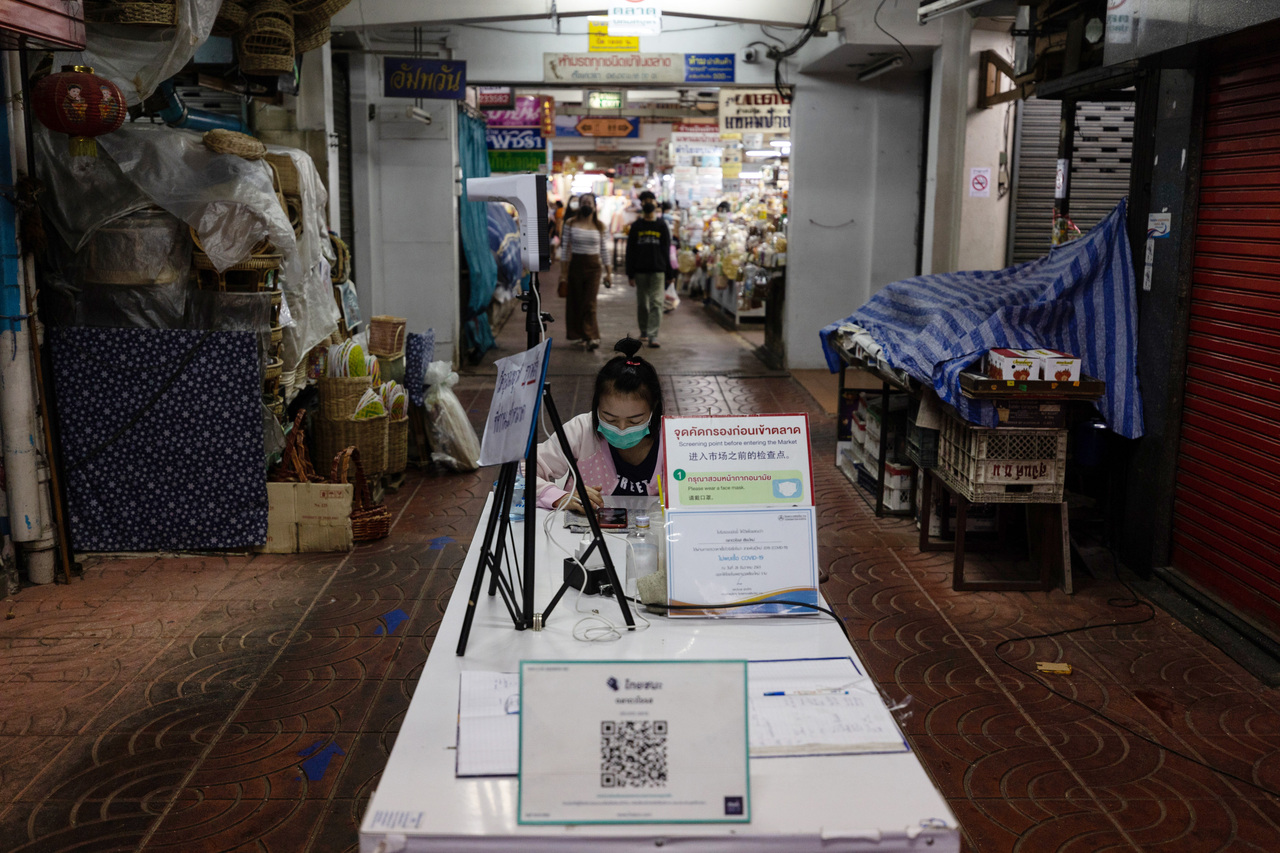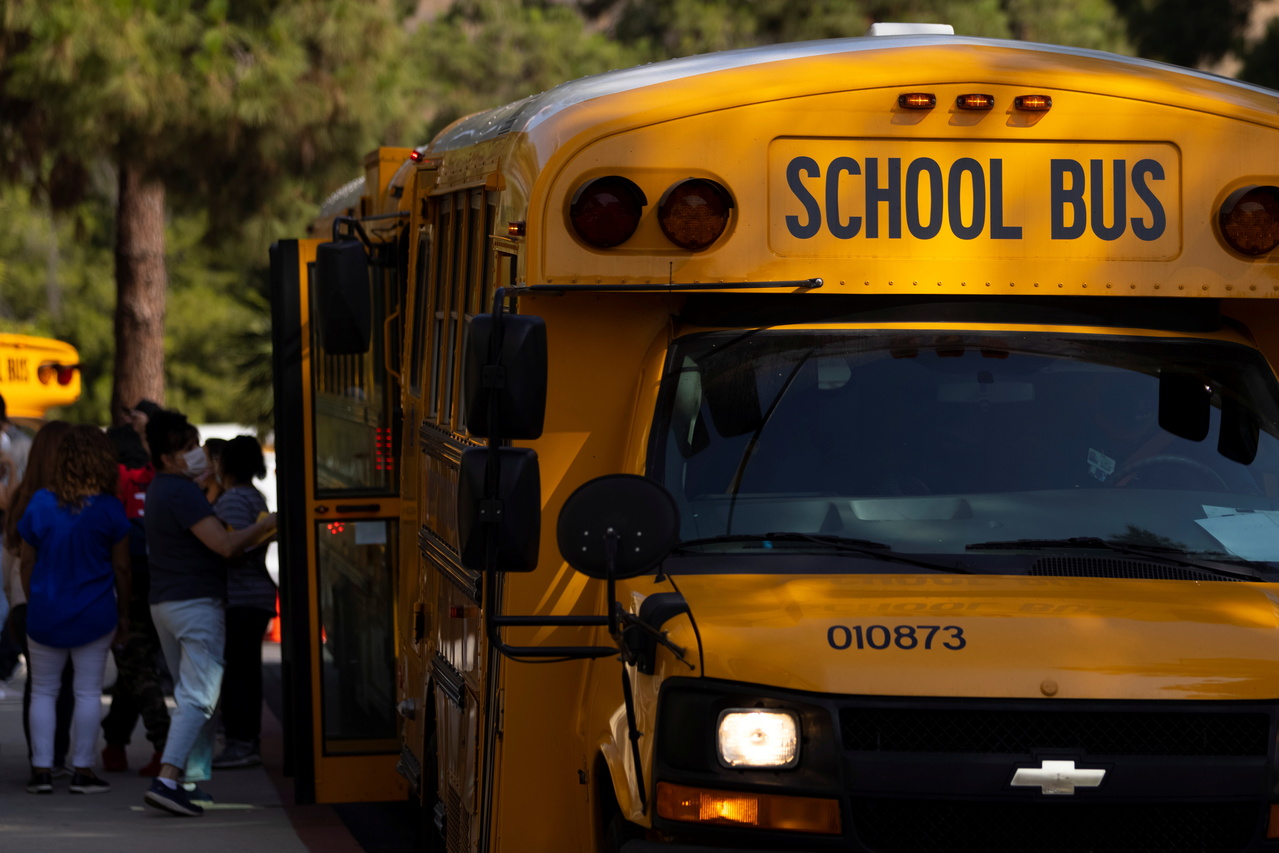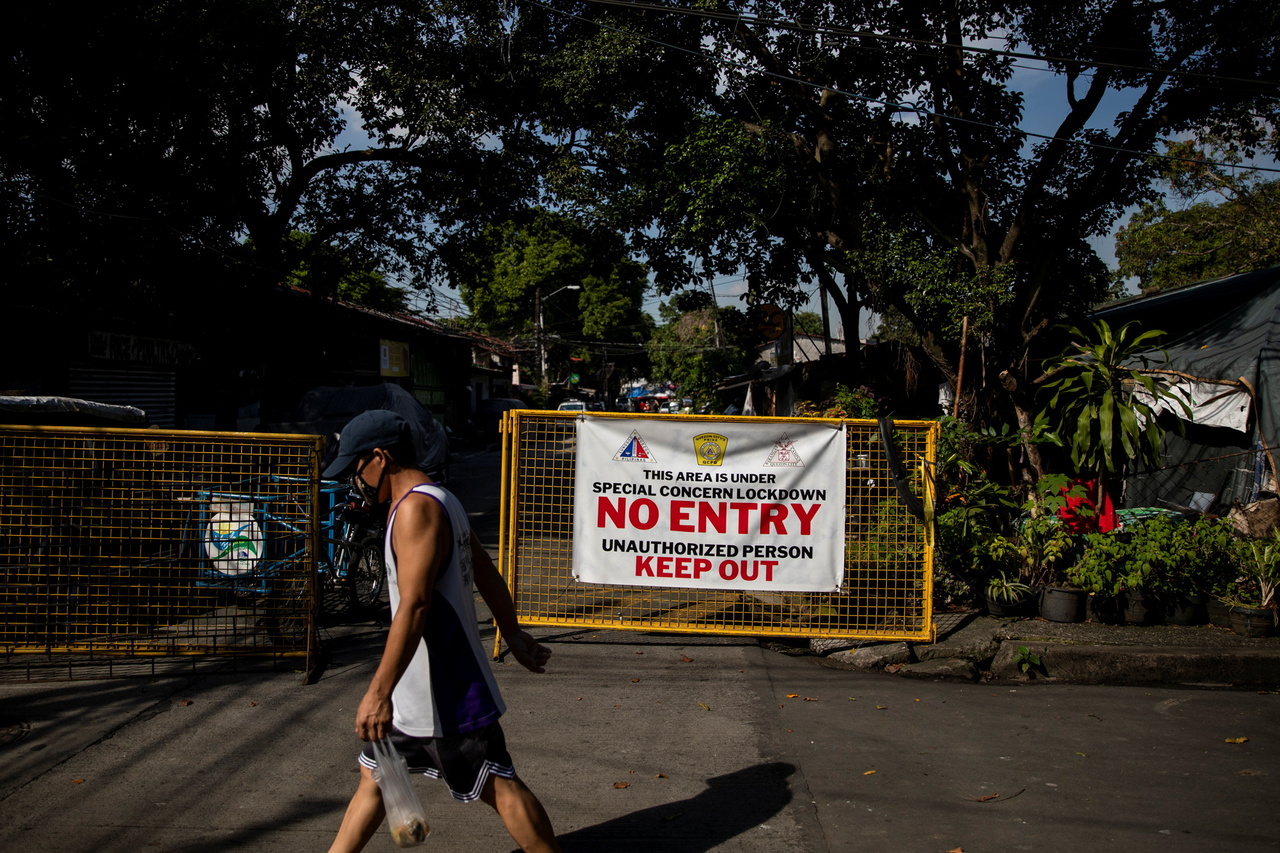Governments face tough call on risky reopenings as Covid-19 persists
Sign up now: Get insights on Asia's fast-moving developments

Covid-19 safety notices at the entrance to a market in Chiang Mai, Thailand, on Sept 9, 2021.
PHOTO: BLOOMBERG
SINGAPORE - Save the economy or save more lives? It's a tough call that governments around the world have repeatedly been forced to make throughout the Covid-19 pandemic.
Since the pandemic was declared 1½ years ago, the core question remains the same even as our situation has changed drastically.
Now, we have Covid-19 vaccinations that offer certain protection against severe illness and death.
As more people get immunised, countries can better afford to take small steps towards rolling back the suffocating restrictions that have held their economies and populations in a chokehold for so long.
But the Delta variant threw a spanner in the works, infecting people faster than ever - even some of the vaccinated - and taxing global healthcare systems again. It is now the dominant Covid-19 strain worldwide.
Governments re-examined their plans, with many opting to withhold a complete lifting of restrictions while others tightened and loosened measures as outbreaks waxed and waned.
With the disappointment that the Delta variant brought to those who had been raring to fully reopen their economies and resume socialising, also came a growing fear that another variant far worse than Delta and even harder to contain could soon emerge if people were allowed to mingle more freely.
"The world is seeing three interlinked policy challenges," said Dr Khor Swee Kheng, a Malaysia-based health policies specialist.
"One, how do we balance health, economy and society with an endemic Covid-19 and what is an 'acceptable' level of cases, hospitalisations and deaths?
"Two, how do we manage boosters in the presence of waning immunity levels and new variants like Delta, but balanced by equity and ethical considerations?" he asked.
"And three, how can health, social, political and economic systems cope with the prolonged stresses of Covid-19?"
'A tricky balance'
Ultimately, for policymakers, it comes down to this: Is it worth the risks to reopen the economy and society while Covid-19 is still spreading in the community?
"It's a very tricky situation, having to balance the medical risks of reopening and the ill effects of further prolonging economic shutdowns," said Professor Vip Viprakasit from the Faculty of Medicine Siriraj Hospital at Mahidol University in Thailand.
The United States and Europe, having had earlier access to Covid-19 vaccines than other regions like South-east Asia, have already moved down the reopening path despite fresh surges in coronavirus infections.
In the US, people can move freely between states and schools have resumed in-person classes, even as the seven-day average of new daily Covid-19 cases hovers around 150,000, and about 1,900 people die from the disease each day.
New weekly hospitalisations have stayed around 90,000 over the past month - as high as in early February, shortly after the US rolled out its vaccination campaign - although a recent nationwide study has suggested that nearly half of those newly hospitalised are only mild or asymptomatic cases.
Even so, one in four US hospitals is reporting more than 95 per cent occupancy of intensive care unit beds.

School buses line up outside Woodrow Wilson Senior High School as students return to in-person classes in Los Angeles, California, on Aug 30, 2021.
PHOTO: REUTERS
In Britain, the government has done away with compulsory face masks and social distancing restrictions in most places. The country's seven-day average of new daily infections has fallen below 30,000 from over 38,000 a week ago.
While deaths and hospitalisations are still considerably low compared with the country's earlier waves, the numbers have been creeping up.
The seven-day average of new daily deaths is at 138, having risen steadily from around 10 since June, and new weekly hospitalisations, at about 8,300, are at their highest since March.
Unsurprisingly, loosening curbs often brings an increase in infections, hospitalisations and deaths.
But places like the US and Britain have a few factors on their side: They have fairly high vaccination rates (with 54 per cent of the population fully vaccinated in the US and 66 per cent for Britain), and more than one in 10 of their people have already caught Covid-19.
This means that their collective immunity, whether acquired through vaccination or infection, is likely higher than that of other countries that were more shielded from Covid-19 in the earlier stages of the pandemic.
Asia follows suit
Some countries in Asia are following the Western path towards adapting to life with the virus, as their economies teeter on the brink and state finances are stretched to breaking point.
Malaysia this week said it would reopen more economic sectors as maintaining its lockdown risks further damage to its economy as well as people's mental health.
Its strict movement control order, in place since March last year, is estimated to have cost the economy RM1.1 billion (S$356 million) a day.
The country last month slashed this year's growth forecast to 3 to 4 per cent as it battled to contain a surge of infections driven by the Delta variant. The economy had already shrunk 2 per cent in the second quarter compared with the previous three months.
Some 55 per cent of the Malaysian population have been fully vaccinated, and 6 per cent of its people have had Covid-19.
Its seven-day average of new cases dipped slightly this month, at around 18,600, although average daily deaths, at above 400, are setting fresh records as the authorities clear a backlog of earlier fatalities.
Thailand, too, said this week that it would push ahead with plans to progressively reopen its capital Bangkok and some two dozen other provinces to fully vaccinated visitors from next month, to shore up its battered economy.
Tourism traditionally contributes to a fifth of Thailand's gross domestic product, but that shrivelled to almost nothing after borders were shut.
The economy contracted 6.1 per cent last year, shrinking at the fastest pace in over two decades. The country last month cut this year's growth forecast to 0.7 to 1.2 per cent amid its deadliest wave of infections.
Only about 19 per cent of the population have been fully vaccinated.
Its seven-day average of new cases is around 14,000, with about 170 deaths a day.
Last year, Thailand had registered fewer than 100 Covid-19-related fatalities, but the toll this year has already exceeded 12,000.
There are, however, some positive signs. The daily death toll has been trending downwards over the past month and the number of patients who need intensive care has dropped significantly in the last two weeks, Prof Vip said.
But he added that health experts were concerned that self-testing kits widely distributed across the nation may not pick up milder infections, and that the official case count may not fully account for those who tested positive at home but did not report their findings to the authorities.
A peer-reviewed study led by Prof Vip, to be published in The American Journal of Tropical Medicine and Hygiene next month, found that antigen rapid test kits - while nearly 100 per cent accurate in identifying symptomatic infections - had a sensitivity of just 48 per cent in recognising mild or asymptomatic cases with lower viral loads.
"Personally, I don't think we are ready yet to safely reopen as a nation," said Prof Vip. "Perhaps if the reopening is delayed to end-October, we would then have a better idea of how well we are controlling the situation based on the few extra weeks of additional data and can confirm the trends of the pandemic in Thailand."
Not gone for good
Although some countries may now be forced to give greater priority to rescuing their floundering economies over trying to save more lives through tight restrictions, governments have also made it clear that measures may still be reimposed should the situation take a turn for the worse.
The Philippines, for example, is applying movement curbs in smaller, more targeted zones down to individual streets, in place of wider lockdowns. Less than 17 per cent of Filipinos have been fully vaccinated, and the country has been reporting record numbers of new infections.

<p>A man walks past a street under a localised lockdown amid rising coronavirus disease (COVID-19) infections, in Quezon City, Metro Manila, Philippines, September 16, 2021. REUTERS/Eloisa Lopez</p>
PHOTO: X06751
Britain's Prime Minister Boris Johnson has also warned that he will roll back freedoms if a fresh surge threatens to overwhelm the healthcare system. The West, in particular, is worried that winter will bring more cases, or even a new variant, as people spend more time socialising indoors.
In some places like China, governments are still insistent on pursuing a Covid-zero strategy that aims for total eradication of the virus among their population.
The strategy will put a much bigger dent in their economies, but Prof Vip noted that it also puts them at lower risk of dealing with cases of long-haul Covid-19 syndrome among those infected.
"As a physician, I feel that long-haul Covid poses a huge risk for countries. Not having comorbidities doesn't mean you won't develop long Covid if you get infected. And it may affect not just your lungs, but also your brains or kidneys," he said.
"We don't have comprehensive data yet for the size of the Asian population affected, as Covid-19 is still a very new disease.
"We can take guidance only from US and UK data, which has shown that up to 50 per cent of those infected suffer some residual symptoms weeks or even months after acute infection."
Essentially, policymakers have a tough choice to make, and will have to continually exercise judgment calls as the Covid-19 situation evolves, until the pandemic is truly behind us.
"When governments are deciding on whether, when, who and how fast to reopen, they must remember that science takes them only 50 per cent of the way," Malaysia's Dr Khor said.
"The remaining 50 per cent are political choices, good judgment and inclusive decision making involving citizens within the socio-political contract of that country."


